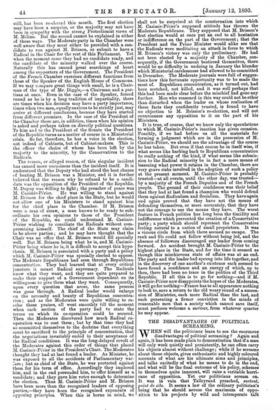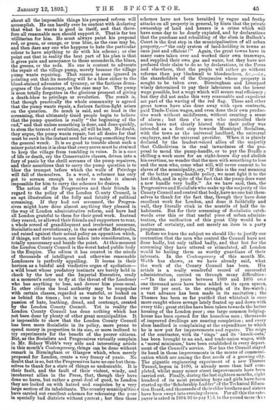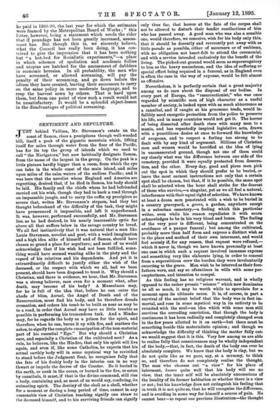THE DISADVANTAGES OF POLITICAL SCREAMING.
WHEN will the politicians learn to see the enormous disadvantages of political screaming ? Again and again, it has been made plain to demonstration that if a man will only work quietly and persistently, he can often carry his objects almost without challenge; while if he screams about those objects, gives enthusiastic and highly coloured accounts of what are his ultimate aims and principles, and talks excitedly of what he means to do in the end, and what will be the final outcome of his policy, schemes in themselves quite innocent, will raise a veritable hurri- cane of opposition. Yet our politicians scream on. It was in vain that Talleyrand preached, surtout, point de zele. It seems a law of the ordinary politician's being that he should arouse the maximum of oppo- sition to his projects by wild and intemperate talk about all the impossible things his proposed. reform will accomplish. He can hardly ever be content with declaring that what he wants is good in itself, and that there- fore all reasonable men should support it. That is far too utilitarian for him. He must always paint his proposal red, or green, or orange, or true blue, as the case may be, and then dare any one who happens to hate the particular colour to have anything to do with his scheme ; or else point out that in reality the best part of his plan is that it gives pain and annoyance to those scoundrels, the blues, the greens, or the reds. No one is content to advocate the repair of the village pump, merely because the village pump wants repairing. That reason is soon .ignored in pointing out that its mending will be a blow either to the blood-stained advocates of tyranny, or the factious dema- gogues of the democracy, as the case may be. The pump is soon totally forgotten in the glorious prospect of giving a death-blow to privilege or revolution. The result is, that though practically the whole community is agreed that the pump wants repair, a furious faction-fight arises on. the question. So much is said, and so loud is the screaming, that ultimately timid people begin to believe that the pump question is really "the beginning of the end," and that unless something is done, and done quickly, to stein the torrent of revolution, all will be lost. No doubt, they argue, the pump wants repair, but all desire for that must be sunk in the instant need for saving something from the general wreck. It is no good to trouble about such a minor pointwh en it is clear that every nerve must be strained to keep the village from tumbling in ruins. It is a case of life or death, cry the Conservative classes, driven into a fury of panic by the shrill screams of the pump repairers, and their assertions that to carry the pump question is to blow the trumpet before which the walls of Privilege will fall of themselves. In a word, a reformer has only got to scream enough in order to make it almost impossible for him to carry the schemes he desires. The action of the Progressives and their friends in regard to the policy of the London Ccunty Council, is an apt illustration of the folly and fatuity of political screaming. If they had not screamed, the Progres- sives might have done almost an thing they pleased in the way of London administrative reform, and have had all London grateful to them for their good work. Instead they roared, or allowed their friends and supporters to roar, a whole screed of grandiloquent and irrelevant nonsense, Socialistic and revolutionary, in the ears of the Metropolis, and raised against their actual policy an opposition which, if things, not their names, are taken into consideration, is totally unnecessary and beside the point. At this moment the London County Council is the worst hated public body in the Empire. The odium it has created in the minds of thousands of intelligent and otherwise reasonable Londoners is perfectly appalling. It looms in their horizon as a baleful and vindictive organ of spoliation— a wild beast whose predatory instincts are barely held in check by the law and the Imperial Executive, ready at a moment's notice to fly at the throat of the Londoner who has anything to lose, and devour him piece-meal. In other cities the local authority may be unpopular with certain classes, regarded as wasteful, or looked on as behind the times ; but in none is to be found the passion of hate, loathing, dread, and contempt, created by the London County Council. Yet in reality the London County Council has done nothing which has not been done by plenty of other great municipalities. It is impossible to show that the London County Council has been more Socialistic in its policy, more prone to spend money in proportion to its size, or more inclined to try experiments for the benefit of the poorer citizens. But, as the Socialists and Progressives virtually complain in Mr. Sidney Webb's very able and interesting article in this month's Contemporary, things can be done without remark in Birmingham or Glasgow which, when merely proposed for London, create a very frenzy of panic. No doubt that is so, but the Progressives have no one but them- selves to thank for a state of things so undesirable. It is their fault, and the fault of their violent, windy, and incoherent allies in the Press, that, though they have done no harm, but rather a great deal of good, to London they are looked on with hatred and suspicion by a very large section of its inhabitants. The country municipalitieLo have carried out excellent schemes for rehousing the poor in specially bad districts without protest; but then those schemes have not been heralded by vague and frothy attacks on all property in general, by hints that the private ownership of land and houses is a crime which will have some day to be dearly expiated, and by declarations that the purchase and rebuilding of the slum in Bullock's Court is the first step in the municipalisation of all urban property,—" the only system of land-holding in towns at once just and efficient !" Again, the great towns have in many cases taken over and worked their own tramwavs, and supplied their own gas and water, but they have not prefaced their claim to do so by declarations, in the Press and elsewhere, that the people will rather go without reforms than pay blackmail to bloodsuckers, &c.,—i.e., the shareholders of the Companies whose property is sought to be taken over. Birmingham and. Ltverpool wisely determined to pay their labourers not the lowest wage possible, but a wage which will secure real efficiency ; but they did not make this very reasonable and expedient act part of the waving of the red flag. These and other great towns have also done away with open contracts, paid Trade-Union wages, and even done their own produc- tive work without middlemen, without creating a sense of alarm ; but then Vie men who controlled their action have not clearly hinted that their policy was intended as a first step towards Municipal Socialism, with the town as the universal landlord, the universal employer, and the universal provider. When it is plainly declared by the loudest-voiced allies of the majority that Collectivism is the real inwardness of the pro- posal to mend the pump-handle, or to pay the Beadle a shilling a week more for an eight-hours day and abolish his overtime, no wonder that the men with something to lose and the men who, come what will, will never consent to be slaves of the municipality, cry," If this is the real meaning of the better pump-handle policy, we must fight it to the last ditch, and in spite of the fact that the pump does want a new handle very badly." As we have said, then, the Progressives and Socialists who make up the majority of the County Council and control that body,have no one but them- selves to thank for the fact that, though they have done excellent work for London, and done it faithfully and well, they literally stink in the nostrils of half the in- habitants. But for their screaming of Socialistic catch- words over this or that useful piece of urban adminis- tration, the unification of this great City would be a matter of certainty, and not merely an item in a party programme.
Before we leave the subject we should like to justify our contention that the men who control the Council have not done badly, but only talked badly, and that but for the screaming they have uttered or stimulated, all London would be hailing them as worthy guardians of their interests. In the Contemporary of this month Mr. Webb has shown, as we have already said, what the work of the County Council has been. His article is a really wonderful record of successful administration, carried on through many difficulties : —" In the six years between 1889 and 1895 over one thousand acres have been added to its open spaces, over 20 per cent, to the strength of its fire-watch ; a vast advance has been made in its sanitation ; the Thames has been so far purified that whitebait is once more caught where sewage lately floated up and down with every tide ; great strides have been taken towards the better housing of the London poor ; one large common lodging- house has been opened for the homeless men ; thousands of improved dwellings are nearing completion ; and every slum landlord is complaining at the expenditure to which he is now put for improvements and repairs. The reign of the contractor, with its 'rings' and its knock-outs,' has been brought to an end, and trade-union wages, with moral minimum,' have been established in every depart- ment of the Council's service. Nor has the Council stayed its hand in those improvements in the means of communi- cation which are among the first needs of a growing city. The gigantic engineering experiment of a new Thames Tunnel, begun in 1890, is already more than half com- pleted, whilst many minor street improvements have been carried out. Finally, during the last eighteen months, eight hundred of its most promising boys and girls have-been started up the 'Scholarship Ladder' of the Technical Educa- tion Board, and thousands of their elder brothers and sisters have been swept into evening classes. For all this the rate- payer is asked in 1894-95 to pay 11-id. in the pound morel hat
he paid in 1889-90, the last year for which the estimates were framed by the Metropolitan Board of Works ; " this litter, however, being a statement which needs the rider that if poundage has not been greatly increased, assess- ment has. But though this is, we sincerely believe, what the Council has really been doing, it has con- trived to give the impression that it has been nothing but "a hot-bed for Socialistic experiments,"—a place in which schemes of spoliation and academic follies and utopias are hatched for the amusement of dabblers in economic heresies. In all probability, the men who have screamed, or allowed screaming, will pay the penalty of their screaming, and go down before the odium they have created, leaving their successors to carry on the same policy in more moderate language, and to reap the harvest sown by others. That is hard upon them, but from one point of view such a result would not be unsatisfactory. It would be a splendid object-lesson in the disadvantages of political screaming.




































 Previous page
Previous page